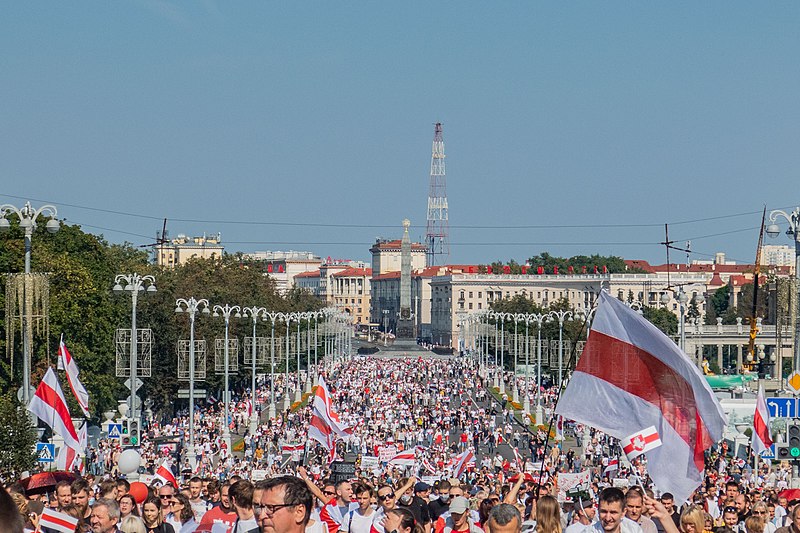"A senseless farce" is how Belarusian opposition leader Sviatlana Tsikhanouskaya described the recent local and parliamentary elections in her country. Only parties swearing allegiance to dictator Lukashenka were allowed to run, the opposition in exile called for a boycott. They were the first elections since the highly controversial 2020 presidential election, in which Lukashenko secured a sixth term in office. As a result, mass demonstrations broke out across the country and were violently suppressed by the regime, with the help of Lukashenka's ally Putin. Relentless repression and inhumane treatment of people the regime sees as a threat has since become routine. Many dissidents have fled abroad where they continue their struggle for a democratic Belarus. As Belarus is drawn further into Russia's sphere of influence and the human rights situation continues to deteriorate, it is a crucial time to stand up for a democratic Belarus.
Elections 2020
As Belarus opened up economically over the past decade and increasingly established trade relations with the EU, many Belarusians hoped that this would bring more political freedom to their country. "Better relations between the EU and Belarus" and the election of two opposition members in 2016 even prompted the EU to lift sanctions against members of the Belarusian elite, including Lukashenka himself. In retrospect, but also given the critical reports of the UN and OSCE at the time, the EU's optimism was premature. In the run-up to the 2020 elections, it would once again become clear that real attempts of opposition to the regime were in vain, many Belarusian opposition candidates were not allowed to stand for election. Some were arrested and prosecuted, including prominent opposition leaders Syarhey Tsikhanouski (18 years) and Viktor Babariko (14 years), who remain in prison to this day. Others had already fled the country due to intimidation and persecution hanging over their heads. Sviatlana Tsikhanouskaya was said to be the only opposition figure allowed to stand as a candidate.
Shortly after the polls closed on 9 August, unrest broke out in cities across Belarus. According to the 'official' results, Lukashenka had won more than 80 per cent of the vote. Many analysts proclaimed Sviatlana Tsikhanouskaya as the real winner of the 2020 elections, even though she received only 9% of the votes, according to the official results. Thousands took to the streets to protest against the unfair electoral process and questionable results. The regime's response was very violent. The police clashed with protesters leaving many injured and some dead. More than 35,000 people were arrested during and after the protests. Many were detained tortured and mistreated.
Inhumane treatment of political prisoners
After a new wave of repression and persecution, which led to the detention of more than 400 people in 2022, almost 1,500 political prisoners in Belarus. Conditions in the penal colonies are known to be inhuman and very heavy. Especially for dissidents, who are forced to wear distinctive yellow markings that distinguish them from other prisoners. They face physical violence, are locked up in so-called 'punishment cells' for alleged violations of prison protocols and receive additional prison time as a result. Adequate medical care is often very limited, which has led to serious health problems and, in some cases, death.
The case Ihar Lednik, a member of the Social Democratic Party who was jailed for three years for "insulting the country's leader", is typical of the conditions of political prisoners in Belarus. Lednik was known to have heart problems when he was sentenced. His health deteriorated rapidly and after less than two years in captivity, he died of cardiac arrest. He was the fifth political prisoner in Belarus to die behind bars in 2023.
Support for Belarus
Although post-election protests in 2020 showed that many Belarusians were willing to risk their freedom and even their lives for democracy, the subsequent crackdown decimated the remaining domestic political opposition. The Russian invasion of Ukraine led to a new wave of arrests which increased the number of political prisoners to 1,500, although the actual number is probably much higher. The fate of many political prisoners remains unclear because the authorities have cut off all contact with their relatives. It is crucial to continue reporting on their horrific conditions and offering support to their relatives abroad.
While the regime's paranoia and repression before 2020 mainly targeted political organisations, broader civil society has suffered severely since then. One of the largest NGOs still active, BirdLife Belarus, was shut down in 2022 along with 300 other groups for "extremist activities". Human rights activists have faced arrests, arbitrary detention, physical violence and intimidation. Some brave activists are still working in Belarus, but most of civil society has gone into exile. Families of those who have fled abroad have been targeted by extreme measures such as false criminal charges and the forced lodging of children with the state. The regime is also trying to discredit people in exile through extensive propaganda campaigns.
There are many initiatives by Belarusians in exile, especially youth and women's groups, that could use support. As Belarus becomes increasingly isolated, it is vital to continue generating attention to the situation in Belarus and the plight of its people. The FMS works with several Belarusian partners and reports regularly on the situation there, read there this page more about it. Helping and assisting the Belarusian opposition and civil society is crucial, as a new time of opportunity is coming. When that time comes, a new generation of politicians, activists and a well-developed civil society must be ready to shape a democratic future for Belarus.




